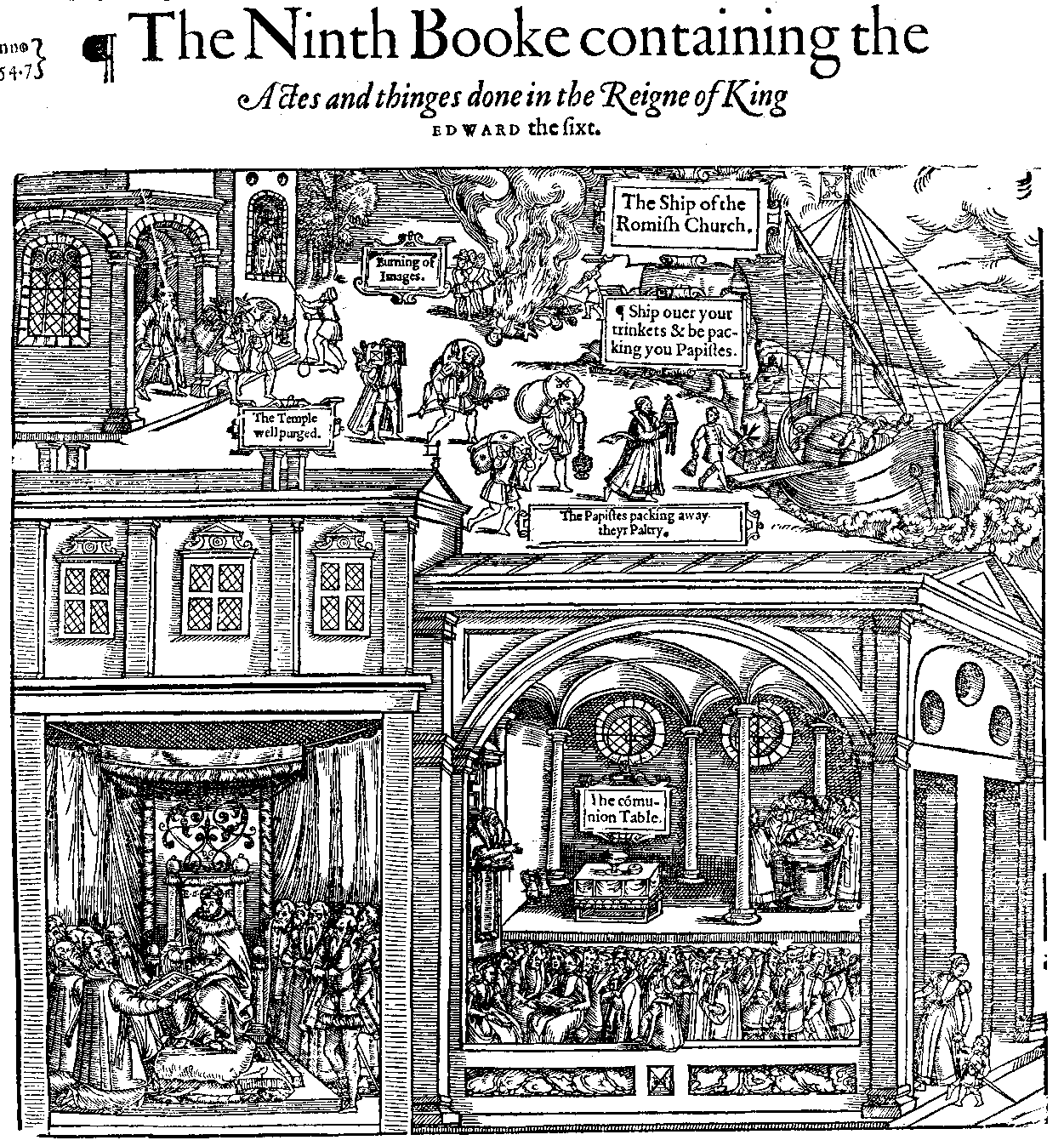1521 [1521]
K. Edward. 6. An. 1547.
¶ The ninth booke containyng the Actes and thyges done in the reigne of kyng Edvvard the 6.
()
MarginaliaEuery plant which my heauenly father hath not planted shall bee plucked vp. Mat. 15.
¶ The ninth booke containyng the Actes and thyges done in the reigne of kyng Edvvard the 6.
()
 [View a larger version]
[View a larger version]
Commentary on the Woodcuts

Like the imposing image at the beginning of the reign of Henry VIII, the woodcut prefacing the reign of Edward VI at the start of Book IX presents pictorial witness to the reforming achievements of the young Josiah. This is a programmatic enactment of the most important 'actes and thinges done' in Edward's reign. It celebrates, in a neat tripartite formula, the most important reforms achieved by a prince 'tender in yeares' but mature in godliness. At the top of the page in a deft compression (helped by its inserted tags) we see how churches were cleared of 'popish trumpery' by burning images, while crosses, chalices, candlesticks, mass books and other discarded ceremonial objects are being transported to banishment in the the 'ship of the Romish Church' by Catholics fleeing into exile. In the lower portion of the woodcut the young king, seated in state before his lords spiritual and temporal, hands the holy book of the word to the divines on his right, as his father had before him. On the other side, in a masterpiece of compression, a reformed church is depicted, furnished for only the two sacraments of baptism and communion. The communion table (labelled as such) is free-standing and not placed against the wall. Meanwhile the preacher (with book) in his pulpit, and the crammed congregation listening below, tell us that the service of the word is the be all and end all. The seated woman with the book is present here, just as in the scene of Latimer preaching, and the role of women in this new world is also indicated by the mother and child mounting the step nearly offstage to the right.
MarginaliaKing Edward deliuerīg the Bible to the Prelates.
King Edward the vj.
MarginaliaAn. 1547.
The reigne and time of K. Edward.AFter the death of kyng Henry succeded kyng Edward his sōne, beyng of the age of ix. yeares. He began hys reigne, the 28. day of Ianuary, and reigned vj. yeres, viij. moneths, and viij. dayes, and deceased. an. 1553. the 6. day of Iuly. Of whose excellent vertues, & singular graces wrought in him by the gift of God, although nothing can be said enough to his commendation: yet because the renowmed fame of such a worthy Prince shall not vtterly passe our story without some gratefull remembraunce, I thought in fewe wordes to touch some little por-tion of his prayse, taken out of great heapes of matter, which might bee inferred. For to stand vppon all that might be sayd of him, it would be to long: and yet to say nothing, it were to much vnkynd. If kynges and Princes which haue wisely and vertuously gouerned, haue found in all ages writers to solemnise and celebrate their Actes and memory, such as neuer knew them nor were subiect vnto them, how much then are we Englishe men bound, not to forget our duetie to kyng Edward, MarginaliaCommendation of Kyng Edward.a Prince although but tender in yeares, yet for hys sage and mature rypenes in wytte and all princely ornamentes, as I see but few to whom he may not bee equall, so agayne I see not many, to whom he may not iustly be preferred.
[Back to Top]And here to vse the example of Plutarch in comparyng kyngs and rulers, the Latines with the Grekes together: if I shoulde seeke with whom to match this noble Edward, I finde not with whom to make my
match
AAAa.j.


 1570 Edition | Book 9 | Page 1521
1570 Edition | Book 9 | Page 1521 